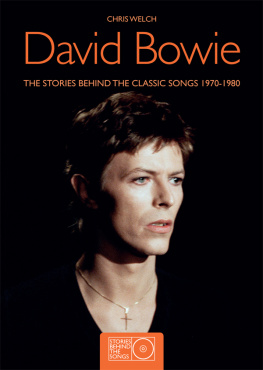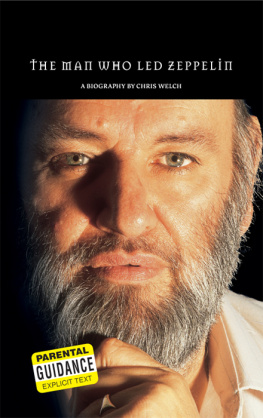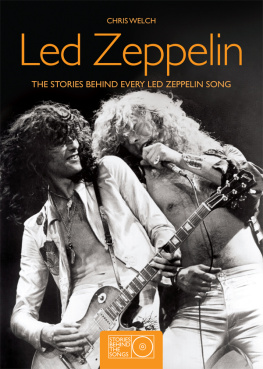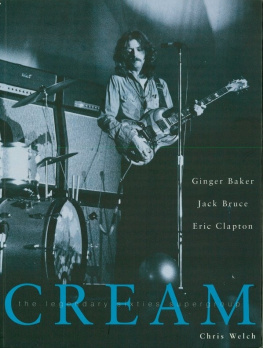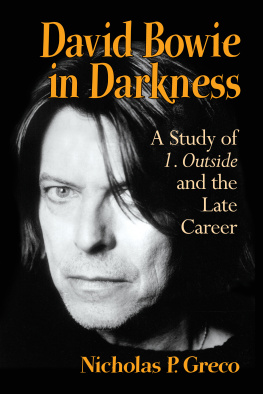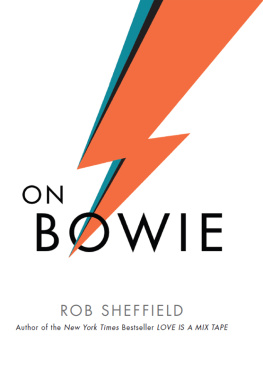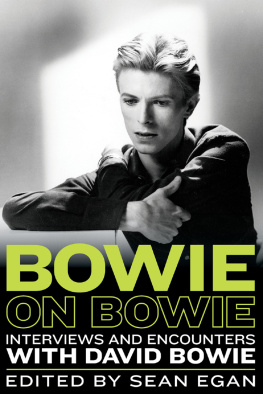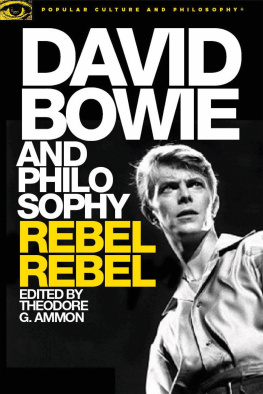
THIS IS A CARLTON BOOK
This edition published by Carlton Books Limited
20 Mortimer Street
London W1T 3JW
Text copyright 1999, 2010 Chris Welch
Design copyright 2010 Carlton Books Limited
This book is sold subject to the condition that it shall not, by way of trade or otherwise, be lent, resold, hired out or otherwise circulated without the publishers prior written consent in any form of binding or cover other than that in which it is published and without a similar condition including this condition, being imposed upon the subsequent purchaser. All rights reserved.
eISBN 978-1-78011-200-8
CONTENTS

THE EARLY RELEASES
Few artists have embraced so many changes of style, character and musical direction as David Bowie.
Yet throughout an extraordinary career that has spanned five decades, Bowie has retained the essential ingredients that have made him a legend. Magnetism, mystery, and conflicting strands of strength and vulnerability are characteristic of this enduringly popular figure and hugely influential artist.
Change has indeed been his life blood since Bowie first began his career as a performing artist. From Major Tom to Ziggy Stardust and from The Man Who Fell To Earth to Thin White Duke, trend-setting Bowie has been changing not just himself but the world about him.
David Bowie has come a long way since he was the good-looking, young Mod vainly trying to break into the Sixties pop scene. In those pre-Ziggy days he was a penniless star waiting to be born, but then came the first of many changes, sparked as much by his restless, active mind as by the need for com-mercial success. The solo singer scored a resounding hit with Space Oddity in 1969 but he was not satis-fied. Soon he embraced the vibrant new underground rock sounds that emanated from New York. Under the influence of Lou Reed and Iggy Pop, and aided by guitarist Mick Ronson, he created such astonishingly innova-tive albums as The Man Who Sold The World, The Rise And Fall Of Ziggy Stardust And The Spiders From Mars, and Aladdin Sane. They proved a sensation and amid the furore of controversy about his glit-tering pop image and overt sexuality, Bowie became the first androgynous rock star and, inadvertently, sparked the Glam Rock boom.
The early Seventies were golden years for Bowie and success did not stop coming even when he deliberately killed off Ziggy Stardust at a dramatic farewell concert in July, 1973. Bowie underwent more drastic changes in the years ahead, and was still undergoing this process of evolution in 1997, when he was 50. Although he sometimes strained the patience and loyalty of fans and critics, he invariably came up with songs, music, films, videos, concerts and albums that were always challenging and at the cutting edge. He has been full of surprises too. Only David, in the middle of Ziggy madness, could bring out Pin Ups an album of R & B covers. He delved into Germanic electro rock during his Low and Heroes period, and amid squeals of outrage from his oldest fans, formed a controversial neo-metal band appropriately called Tin Machine. He aroused the critics wrath on many occasions by such perceived inconsistency. Apparently contradicting his proclaimed beliefs, Bowie undermined the faith of his supporters by shamelessly switching views on everything from sex to politics to his own background and influences. Indeed his life has been full of ironies.
As a Zen Buddhist he sought peace and humility, but also briefly flirted with ideas of supermen and fascism. A bisexual, he once proclaimed to the press that he was gay and then later admitted that he had said such things largely in the interests of publicity and promotion. And the idealistic youth, who once accused hippies of being capitalists, has become one of the richest men on the planet, worth countless millions, from astute business practices.
Its no wonder that some of his followers have sometimes felt let down. As a consequence, Bowie has been the victim of the most virulent and intense criticism. On one occasion, an enraged music critic virtually shouted at him Sit down sir! in an article that, apparently, had the victim in fits of unrestrained laughter.
Even members of his own family have been known to pile insults and abuse on his head. It is a measure of his almost hypnotic appeal that he can arouse such passions, ranging from idolatry to scorn. If he wasnt so special, nobody would care. Bowie has been called many things cold, manipulative, uncaring and even cynical. What critics fail to see is the restless, sensitive spirit who needs to seek all lifes opportunities and attractions in order to find fulfilment and satisfaction. His need to move on has been paramount, even if the process has sometimes been hurtful. Having been brought up in suburbia, with its fixed ideas, fixed locations and stolid class values, Bowie desperately needed to escape to allow his imagination free rein. He had to explore, to find new friends, mentors and gurus, to experiment and embrace everything from ballet, mime and art to religion and modern jazz. Each new passion was seized upon with the boundless energy and enthusiasm of youth. Mod culture, hippie idealism, pop stardom and the politics of the record business were all a part of his life-forming experiences. In contrast with this image of Bowie the avant garde, hustling go-getter, there is another picture of Bowie as the exhausted flower childlazy, petulant, tearful and unwilling to work. This is Bowie the bane of managers and record producers, the Bowie who preferred to stay idly in bed rather than get up and face the world.
However, the David Bowie that the pop community first encountered in the Sixties wasnt cold, idle or uncaring. Quite the reverse. He was, and remains, an essentially sensitive, considerate, hardworking, intelligent and charming person. In those early days he often seemed lonely and neglected, a far cry from the boisterous, swaggering image of Ziggy Stardust, the universal centre of attention. Young Bowie would give freely of his time, affections and commitment to people. This only made it all the more painful when he had to move on, in his ceaseless quest to make a more meaningful life for himself.
Bowies changes affected family and friends as well as business and musical partners. He would form, quit and then break up bands. He changed managers, record labels, producers and musicians. He married and then divorced. He was a socialite and then a recluse; a globe-trotter and then an exile. Hed be promiscuous and experiment with drugs and then hed reappear as an abstemious control freak. The red-haired rebel became a smart-suited, neatly-coiffeured business tycoon. The man who sold the world would duet with Bing Crosby on Little Drummer Boy. The David Bowie who could produce The Laughing Gnome also produced such uncompromising material as Hearts Filthy Lesson from his 1995 album Outside.
Where did all this talent and this strange mixture of ideas and influences come from? David Robert Jones was born at Stansfield Road, Brixton, London on January 8, 1947.
His father was Haywood Stenton Jones (born 1912), and his mother was Peggy Burns; she already had a son, Terry. The couple were married in September, 1947. In the mid-Fifties the family moved to Plaistow Grove, Bromley and Bowie went to Burnt Ash Junior School, and then Bromley Technical High School in 1958 where he met future Herd and Humble Pie guitarist Peter Frampton, whose father was a tutor at the school.
Next page
